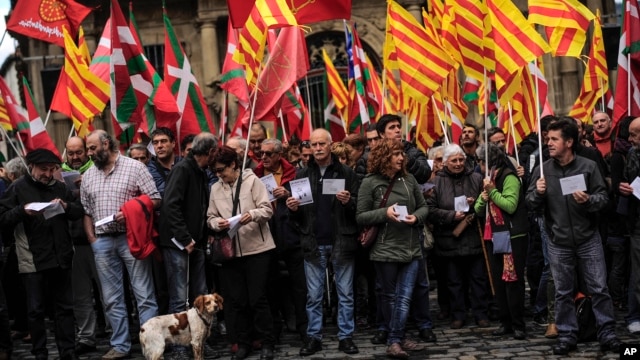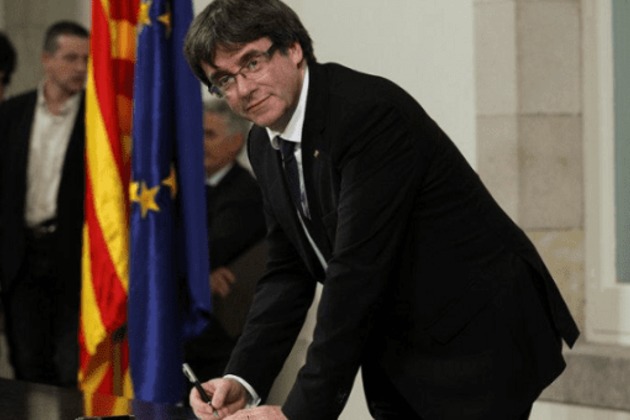Dissent
Rookie
- Banned
- #1
Spain votes to stop Catalonia independence referendum - Yahoo! News
Hate to see this turn into a civil war...never ends well.
Hate to see this turn into a civil war...never ends well.
Follow along with the video below to see how to install our site as a web app on your home screen.
Note: This feature may not be available in some browsers.
Scotland’s referendum on Thursday next week has put the wind in the sails of nationalists in this northeastern Spanish region who want to seize sovereignty of their land from Madrid. “If a nation such as Scotland can vote, why not Catalonia?” said regional President Artur Mas, who has defied Madrid by calling a vote on Catalan independence for Nov. 9. “If the Catalan population wants to vote on its future, it’s practically impossible to stop that forever,” he said in an interview on Wednesday. The Scottish vote was due just a week after the most sensitive day of the year for Catalonia: yesterday’s Diada, the annual Catalan national commemoration.
Spain’s national government fiercely opposes any move toward independence for Catalonia. It has branded the planned vote illegal and vowed to block it. “I think it’s absurd to pretend that [the illegality of the vote] could be so and I think the Spanish government will have to realize that,” Mas said. He said Scotland’s vote could smooth the way for Catalonia on its own drive for independence. EU officials have said that breaking away to form new states would leave Scotland and Catalonia automatically out of the EU, but Mas said: “If the ‘Yes’ wins, I am sure there will be negotiations very quickly, even immediately, to try to keep Scotland in the EU.”
The Diada marks what many in the region see as the day Catalonia lost its autonomy: Sept. 11, 1714, when Barcelona fell to Spanish and French forces in the War of the Spanish Succession. Mas kicked off commemorations on Wednesday evening to mark the 300th Diada by laying a wreath at a mass grave for Catalans killed in the 1714 siege of Barcelona. On Thursday afternoon, supporters of independence were to mass along two central Barcelona avenues in the shape of a giant letter V for “vote,” which they hope will stretch for 11km.
Organizers say more than half a million people signed up for the demonstration, which aimed to fill the streets with red and yellow Catalan flags. “Three hundred years ago, they took away our freedom by force. Now we will get it back by votes,” said Ramon Puig, a retired banker of 66. Proud of their distinct Catalan language and culture, many of Catalonia’s 7.5 million inhabitants feel shortchanged by the national government in Madrid, which redistributes their taxes. Catalonia accounts for a fifth of Spain’s economy, but it was hard hit by the 2008 financial crisis, fueling a surge in pro-separatist sentiments. Opponents of secession think cutting themselves off from Spain would be an economic disaster.
MORE
Spain's Constitutional Court on Tuesday ordered Catalonia to suspend the vote. However, Catalonia is pushing ahead with an informal vote with thousands of volunteers manning the voting stations.
Opinion polls indicate as many as 80 percent of the 7.5 million people in the region want more autonomy from Spain, with about 50 percent in favor of complete independence.

Pro-independence demonstrators of Catalonia and Basque Country raise their regional flags as they gather on a square to support an informal independence poll to celebrate in Catalonia, in Pamplona northern Spain
Catalonia is one of Spain's wealthiest regions. Its long-standing desire for independence has been fueled more recently by the country's deep recession over the past few years.
Catalonia Holds Informal Vote on Secession From Spain
Spain votes to stop Catalonia independence referendum - Yahoo! News
Hate to see this turn into a civil war...never ends well.
Modern Spain is a conglomerations of different regions and cultures. It only came into existence when Ferdinand and Isabella confirmed their kingdom. Almost all of Spain could be split - especially the Balearic Islands.
The Constitutional Court’s ruling was not a surprise. The Spanish government had repeatedly insisted the referendum was illegal. Regional leaders defied the Madrid-based central government and held the Oct. 1 vote even after police seized millions of ballots and used force to close polling stations. Supporters of secession maintain the “Yes” vote won and Catalan officials have a mandate to declare independence. Portraying the central government as repressive, they showed no signs of giving up despite the court ruling that concluded the referendum was invalid. Thousands of people holding candles and banners flooded a main avenue in Barcelona on Tuesday night to demand the release of the two Catalan activists jailed by Spanish authorities on possible sedition charges a day earlier.
Jordi Sanchez and Jordi Cuixart, the leaders of grassroots organizations Catalan National Assembly and Omnium Cultural, are being investigated for organizing rallies last month that allegedly hampered a judicial probe of preparations for the secession vote. “We are facing an executive power in the state that uses the judiciary branch to block the legislative,” Catalan government spokesman Jordi Turull told reporters shortly after the Constitutional Court ruling was announced. Spanish Justice Minister Rafael Catala said Sanchez and Cuixart, were jailed because they are suspected of committed crimes by interfering with a judge’s orders. Catala rejected the term “political prisoners” to describe the two, saying it could be considered a case of “politicians in prison.”

Holding signs reading in Catalan ‘freedom’, people gather to protest against the National Court’s decision to imprison civil society leaders without bail, in Barcelona, Spain, Tuesday, Oct. 17, 2017. Protesters were gathering for a fresh round of demonstrations in Barcelona Tuesday to demand the release of two leaders of Catalonia’s pro-independence movement who were jailed in a sedition probe.
Catalan President Carles Puigdemont made an ambiguous statement about the region’s future last week, saying he has the mandate to declare independence but adding that he would not immediately move to implement it in order to allow time for talks with the central government. Spain has said that no dialogue can take place with independence on the table because a reform of the country’s Constitution with an ample majority in the national parliament is the only legal way to achieve secession. On Monday, a Madrid judge provisionally jailed Sanchez and Cuixart, leaders of different grassroots groups promoting independence for Catalonia. The judge ruled they were behind huge demonstrations Sept. 20-21 in Barcelona that got in the way of a police operation designed to prevent the referendum.
Participants in the Tuesday protest chanted, “Political prisoners, freedom.” Meanwhile, Agusti Alcoberro, the man who standing in for Sanchez as head of the Assemblea Nacional Catalana, said peaceful protests would be the local response to what he said was the Spanish government’s heavy-handed approach. “No modern state in the 21st century can survive if it bases its legitimacy on subjugating politically and dominating part of its population with the police and military,” Alcoberro told The Associated Press. “That is suicidal, and somebody should explain it to the Spanish government.”
Catalans protest sedition case, court declares vote illegal

The unprecedented measure was announced after the Catalan leader threatened a unilateral declaration of independence if the Spanish government did not agree to talks on the issue. The Spanish government issued a statement on Thursday morning saying Puigdemont had ignored its calls to drop his independence plans and had once again failed to confirm whether independence had actually been declared. It said as a result of the decisions made by Puigdemont, the government would invoke article 155 of the Spanish constitution to begin the process of suspending the region’s self-rule. It said in the statement, “At an emergency meeting on Saturday, the cabinet will approve measures to be put before the Senate to protect the general interest of Spaniards, including the citizens of Catalonia, and to restore constitutional order in the autonomous community.” Further, Madrid criticised the Catalan government for “deliberately and systematically seeking institutional confrontation, despite the serious damage it is causing to coexistence and Catalonia’s economy.”
Puigdemont wrote a letter to the Spanish prime minister, Mariano Rajoy earlier on Thursday, which was the deadline set by Madrid for the region to abandon its independence plans, in which the leader wrote that discussions were the only way to resolve the crisis. Puigdemont has accused Spanish authorities of seeking to repress the independence movement after a national court judge denied two of its leaders bail this week. It said that using article 155 would force his hand. Puigdemont, who signed a declaration of independence on October 10, has proposed that its effects be suspended for two months while both sides open dialogue aimed at ending the standoff.

He wrote in the letter, “The suspension [of the independence declaration] is still in place. The [Spanish] state is entitled to decide to apply article 155 if it secures the Senate's approval. But despite all our efforts and our desire for dialogue, the fact that the only reply we have been given is that autonomy will be suspended suggests that you do not understand the problem and do not wish to talk. If the [Spanish] government persists in hindering dialogue and continues with its repression, the Catalan parliament could, if it deems appropriate, proceed to vote on the formal declaration of independence, which it did not do on 10 October.” While Puigdemont had argued that the unilateral independence referendum held on October 1, in which 90 percent of participants opted for independence, has given his government the mandate to forge a sovereign state.
According to Catalan government figures, however, the turnout was only around 43 percent. So far, Senior European officials have insisted that the secession issue is an internal matter for Spain. Addressing the European Union summit in Brussels on Thursday, the French president, Emmanuel Macron, said the event would be “marked by a message of unity around member states amid the crises they could face; unity around Spain.” Meanwhile, the German chancellor, Angela Merkel has backed the Spanish government’s position, and said, “We hope there are solutions found on the basis of the Spanish constitution.” The article 155, which has never been used before, will mean that the Spanish government will need to lodge a formal complaint with Puigdemont, then submit its proposals to the Senate for debate and approval.
Earlier this week, a Spanish government spokesman said that article 155 had been designed not to remove Catalonia’s autonomy, but to ensure its autonomous government adhered to the law. He explained, “We have envisaged a range of scenarios and will apply 155 accordingly. It’s not a question of applying it in its entirety or of taking over every government function or department. Clearly, the Catalan government would lose many of its powers, though not all. It’s a case of using a scalpel, not an axe.” If the Catalan government were to call a snap regional election without confirming independence, the application of article 155 could still be avoided in theory. On Wednesday, the Catalan foreign minister, Raül Romeva, said, “Elections from our perspective are not an option.” Meanwhile, in a last-minute call on Wednesday, Rajoy called for Puigdemont to calm the situation and act in the interests of all Spaniards and Catalans.
Spain to suspend Catalonias autonomy impose direct rule